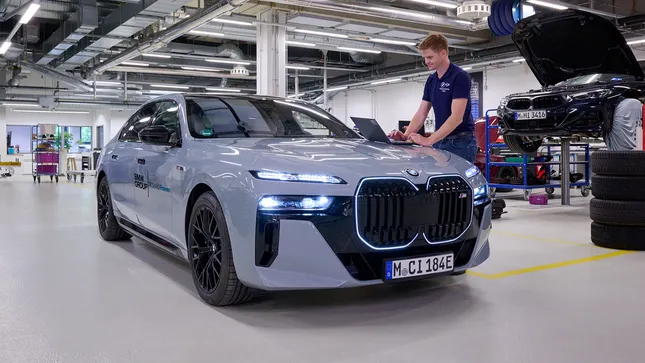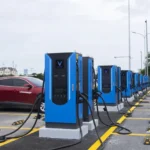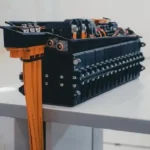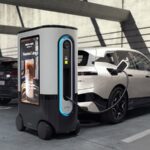Solid-state batteries are considered the “holy grail” for electric vehicle manufacturers. This revolutionary technology promises to completely replace current battery types such as LFP and NMC.
Despite a recent slowdown in the global electric vehicle market, leading car brands remain committed to the solid-state battery race.
Automotive giants like BMW, Mercedes-Benz, and Stellantis continue to invest billions in this technology. Their shared goal is to achieve a range of 1,000 km for electric vehicles on a single charge.
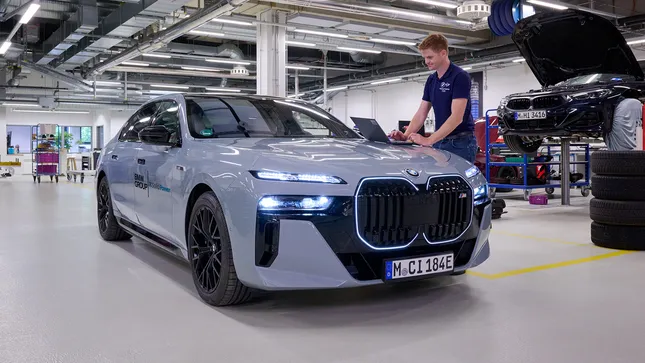
BMW has begun testing solid-state batteries in its large luxury sedan, the i7.
Recently, BMW started testing a special i7 prototype in Munich, equipped with large-size solid-state batteries from Solid Power, an American company. These batteries use a sulfur-based electrolyte and are expected to be featured in the upcoming Neue Klasse electric vehicle series.
However, BMW stated that mass production of vehicles using solid-state batteries would have to wait until the early 2030s.
Not to be outdone, Mercedes-Benz is also testing an improved EQS, fitted with solid-state batteries from their partner, Factorial Energy. The testing process began in February this year.
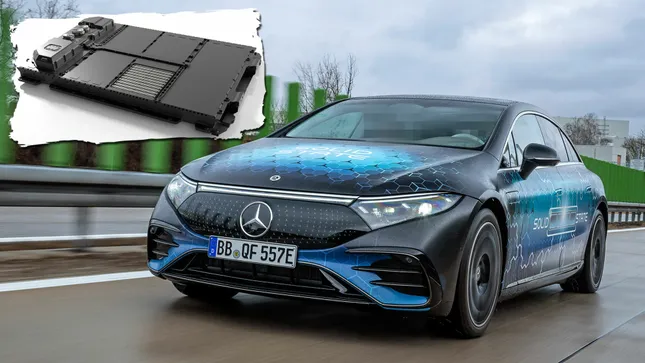
The Mercedes-Benz EQS sedan undergoing road tests with solid-state batteries.
According to Auto News, this new battery will offer 25% higher energy density than current batteries, while being lighter and more compact. This not only extends the vehicle’s range but also opens up new design possibilities for future Mercedes-Benz electric vehicles.
“The benefits of solid-state batteries go beyond just increased range; they also expand the design possibilities for vehicles. Additionally, solid-state batteries are safer as the cells are less prone to overheating,” said Uwe Keller, Head of Battery Development at Mercedes-Benz.
Stellantis (owner of brands like Peugeot, Jeep, and Fiat…) is also closely monitoring solid-state battery technology through its collaboration with Factorial Energy. They plan to start testing in 2026.
Anne Laliron, Senior Vice President of Technology Research at Stellantis, commented: “Solid-state batteries are the future of battery technology. They offer manufacturers the choice between increasing the range or reducing the amount of material used. Both options contribute to lowering costs and carbon emissions.”
In Japan, automotive giants Toyota and Nissan have set specific targets for solid-state batteries. Toyota plans to commence commercial production in 2027, while Nissan aims for a 2028 launch.
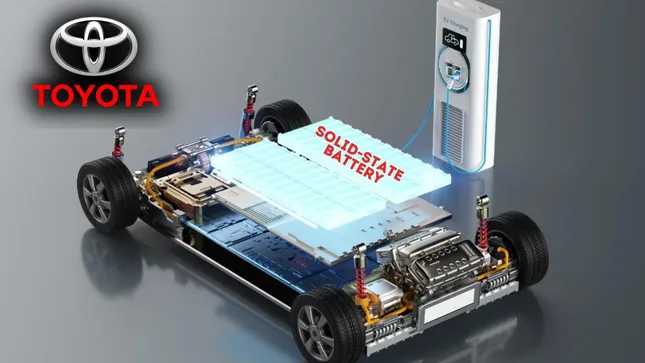
Toyota’s conceptual illustration of its solid-state battery structure.
However, given Nissan’s internal challenges, experts believe this timeline may be delayed. Honda is also gradually researching and developing solid-state batteries for both automobiles and motorcycles.
These moves by Japanese automakers aim to keep pace with Chinese carmakers in battery technology. In China, battery giants like CATL, BYD, and Nio compete and collaborate to accelerate the commercialization of solid-state batteries.
CATL, in particular, has made unique advancements such as lithium-metal batteries, dual-battery systems offering a 1,500 km range, and ultra-durable sodium-ion batteries.
Despite technical and cost hurdles, solid-state batteries are seen as the next significant step in the global electrification of vehicles. Thus, automotive leaders remain steadfast in their pursuit, even staking significant resources on this race.
“VinFast VF 9 Owner Tests Out Hanoi’s Largest Super-Fast Charging Station: ‘9-Minute, 50km Range Boost, Convenient Location, High-Power Chargers All Around’”
“The largest super-fast charging station in Hanoi has impressed car owner, Mr. Nguyen Duc Tuan, with its convenient location, spacious parking lot, and high-powered charging stalls. Mr. Tuan praised the station for offering a seamless and efficient charging experience with its well-designed facilities.”
“V-Green Unveils Hanoi’s Largest Ultra-Fast EV Charging Hub: 42 Chargers, 84 Vehicles at Once”
VinFast’s newly constructed electric vehicle charging station in Nhon, Hanoi, with its impressive 84 ultra-fast charging ports, has been receiving rave reviews from car owners.
Electric Vehicle Charging: The Future is Here with an 18-Second Wonder
A UK-based company has been given the green light to mass-produce an ultra-high-power electric vehicle (EV) battery that can be fully charged in a mere 18 seconds. This groundbreaking innovation has the potential to revolutionize the EV industry, as it offers a swift and efficient charging solution that could be adopted by various electric car manufacturers.

